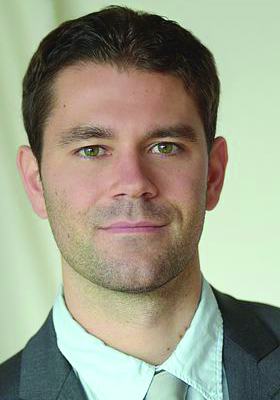Joe Fairless is founder of Fairless Investing and host of the “Best Real Estate Investing Advice Ever” podcast. Fairless Investing controls more than $99 million in multifamily units, primarily in Dallas and Houston, and provides turnkey investments to real estate investors. Joe Fairless also hosts the world’s longest-running daily real estate podcast, which generates more than 200,000 downloads a month. His guests have included Barbara Corcoran of TV’s “Shark Tank” and “Rich Dad Poor Dad” author Robert Kiyosaki. Before setting his sights on a real estate career, Fairless was an advertising executive. In this One-to-One conversation with contributing writer Robert Springer, Fairless explains how—and why—he got started in multifamily real estate investing.
In this One-to-One conversation with contributing writer Robert Springer, Fairless explains how—and why—he got started in multifamily real estate investing.
TR: Lacking a real estate background, what was the hardest part of getting started in real estate for you? Your first large deal was a $6 million multifamily unit, right?
Joe Fairless: The hardest part of getting started was being taken seriously as a buyer when I didn’t have the track record for a multifamily experience. I’d owned single-family homes.
Having credibility is important within the very small group that is commercial real estate, and so what I needed to do was leverage the relationships I had and figure out creative ways to get into the business. One way I did my first handful of deals was partnering with a property management company. They brought their own equity as well as investor equity into the deal, and they had the balance sheet from a liquidity and net worth standpoint to get us the best loan terms.
And they helped us from a credibility standpoint because they had been around a lot longer as a company than my company. This enabled us to leverage their experience and balance sheet, raise money and bring our own money into the deal for them. Combining all of that, we were able to close the first handful of deals.
TR: What made you decide multifamily was the best investment fit for you?
Joe Fairless: Because I had been looking at my profit-and-loss statement from my single-family homes, and I noticed I would make $250 a month on average for each of them, which is great. And then once a tenant moved out, I’d have to pay about $5,000 in make-ready costs before the new tenant would be able to move back in, and that just kills your bottom line for 12 to 24 months, basically wiping all the profits out.
So I decided if I’m going to build a business, I don’t want it to be dependent on one tenant staying or leaving. I want to mitigate the risk and spread it out so I can make more money while purchasing larger properties and not have that risk factor. I decided to start studying multifamily investing, and I saw when one person moves out, you’ve got other people who can still stay there, and you could still make some cash flow, so that’s why I went larger.
TR: You’ve had a successful daily real estate podcast for years. How did you get started in podcasting?
Joe Fairless: It was an idea from my life coach, Trevor McGregor. He said, “Hey, you should check out this podcast thing. A guy named John Lee Dumas does a podcast called ‘Entrepreneur On Fire.’ Think you could do something like that?” I said, ”I don’t know what you’re talking about, but sure.’ I was familiar with podcasts but was not a listener.
So I said, ”It is September [2012] right now. I’m going to make a commitment to do a podcast a day for the rest of the year. So I’ll do it for three months—October, November and December—and then take a step back and see if it’s a good use of my time.”
And I’ve been doing it now for more than two years. It’s the world’s longest-running daily real estate podcast, and I’ve interviewed Barbara Corcoran from “Shark Tank” and Robert Kiyosaki. It’s an interview format primarily, and it’s the second-best business decision I’ve made.
TR: Was your best decision to go from advertising to real estate?
Joe Fairless: You’re a mind reader.
TR: Was it a challenge to get people to come on and talk and return your calls when you were starting out doing your podcasts?
Joe Fairless: Fortunately, one of my strengths is I build relationships as I go through life, so I was able to get fairly good responses from people, friends and those in my network to be interviewed. But there were times when I was in the in-between stage of I’ve reached out to all my people and their friends and I haven’t quite hit a tipping point with the podcasts with popularity, so who else do I reach out to? I mean, I was having to come up with some pretty creative solutions. One of them was my roommate who had invested in a sixplex. He didn’t know it, but when he got home from his job at Macy’s at 5:30 p.m., he was about to be interviewed for a podcast that was supposed to air that day.
I also ended up doing some special series which now are still on the show and that stuck. One of them is “Follow Along Friday,” where I talk about what I’ve got going on in my entrepreneurial career and lessons I’ve learned. Well, that was created out of necessity at the beginning because I was struggling to keep up with the daily routine of getting guests, interviewing them, editing episodes, etc.
TR: You must learn a ton from the people who are on your show. Could you pick out a couple nuggets that stick in your mind, some good pieces of advice you’ve heard from people you’ve interviewed?
Joe Fairless: Yeah, absolutely. One is from Barbara Corcoran, a “shark investor” on “Shark Tank,” and she talked about putting people in a position to succeed based on their strengths. And she tells a story on the podcast where she was on an airplane and there was a flight attendant dealing with a disgruntled passenger whose potatoes weren’t warm enough. It was pretty ridiculous he was upset about that.
So the flight attendant says in a silly voice, “Hey, potatoes. Why are you so cold when you should be warmer than that?” That got him smiling, got the whole cabin smiling and all the passengers were laughing. Barbara thought to herself, “That flight attendant has sales experience she doesn’t even know she has.” So she ended up putting the flight attendant as one of her lead salespeople, and she’s still with the company and with Barbara today.
So for my businesses, it’s important we identify what we need and then find the person whose natural abilities and interests align with that need, because it’s one thing to know what someone’s good at, but if it doesn’t exactly align with what we need, then it’s not relevant to us. That’s one lesson I learned.
Another lesson is raising money is the top of the real estate heap. If you have access to money, then you become a deal magnet. One of my guests said that, and that quote always stuck with me. It’s a big mistake for investors to go try and find a deal if they don’t have the buyers. Real estate, as I mentioned earlier, is a very small group of people, especially commercial real estate. If you lock something up and you don’t close, you get a bad reputation. Do that enough times, you’re not going to get any deals done, or at least not any good ones done.
























0 Comments